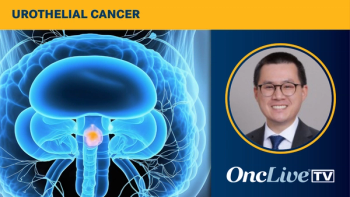
FDA Approval Insights: Sacituzumab Govitecan in Urothelial Cancer

Dr. Tagawa discusses the FDA approval of sacituzumab govitecan in urothelial cancer, key efficacy and safety data from the pivotal TROPHY-U-01 trial, and expectations for the confirmatory TROPiCS-04 trial.
Welcome to OncLive On Air®! I’m your host today, Jessica Hergert.
OncLive On Air® is a podcast from OncLive®, which provides oncology professionals with the resources and information they need to provide the best patient care. In both digital and print formats, OncLive® covers every angle of oncology practice, from new technology to treatment advances to important regulatory decisions.
In today’s episode, we had the pleasure of speaking with Scott T. Tagawa, MD, MS, FACP, professor of medicine and urology, Weill Cornell Medical College, attending physician, NewYork-Presbyterian Hospital, medical director, Genitourinary Oncology Research Program, Weill Cornell Medicine, to discuss the FDA approval of sacituzumab govitecan-hziy (Trodelvy) in locally advanced or metastatic urothelial cancer.
On April 13, 2021, the FDA granted an accelerated approval to sacituzumab govitecan for the treatment of patients with locally advanced or metastatic urothelial cancer who previously received a platinum-containing chemotherapy and either a PD-1 or PD-L1 inhibitor.
The regulatory decision was based on findings from the TROPHY-U-01 trial (IMMU-132-06; NCT03547973), which showed that the antibody-drug conjugate led to a confirmed objective response rate (ORR) of 27.7% (95% CI, 19.6%-36.9%), which included a 5.4% complete response rate and a 22.3% partial response rate. The median duration of response (DOR) achieved with sacituzumab govitecan was 7.2 months (95% CI, 4.7-8.6; range 1.4+, 13.7).
The trial evaluated the agent in 3 cohorts: those with metastatic urothelial cancer who progressed on platinum-based and checkpoint inhibitors (cohort 1; n = 100), those with metastatic urothelial cancer who were not eligible for platinum-based therapy and who had progressed following checkpoint inhibitors (cohort 2; n = 40), and patients with metastatic urothelial cancer who were naïve to checkpoint inhibitors and who had progressed on platinum-based treatment (cohort 3; n = up to 61 patients).
Patients received 10 mg/kg of sacituzumab govitecan on days 1 and 8 every 21 days. Treatment was given until loss of clinical benefit or intolerable toxicity. The primary end point of the trial was ORR by central review; secondary end points comprised safety/tolerability, DOR, progression-free survival (PFS), and overall survival (OS).
Among the 113 patients in cohort 1, the median age was 66 years (range, 33-90). with 23% of patients aged 75 years or older. The majority of patients were White (74%) and had an ECOG performance status of 1 (72%). Twenty-eight percent of patients had visceral metastasis in the liver and the median number of prior regimens received was 3.0 (range, 1-8).
In cohort 1, the median PFS with sacituzumab govitecan was 5.4 months (95% CI, 3.5-6.9), and the median OS was 10.5 months (95% CI, 8.2-12.3).
The most common adverse effects (AEs) that occurred in over 25% of patients who received sacituzumab govitecan included neutropenia, nausea, diarrhea, fatigue, alopecia, anemia, vomiting, constipation, decreased appetite, rash, and abdominal pain.
In cohort 1 specifically, 6% of patients (n = 7) discontinued treatment because of treatment-related AEs; 3 of these patients discontinued because of neutropenia or its complications. Thirty percent of patients required management with granulocyte colony–stimulating factor. One treatment-related death was reported; this patient experienced sepsis in result of febrile neutropenia.
Continued approval will be contingent upon verification of clinical benefit in the confirmatory phase 3 TROPiCS-04 trial (NCT04527991).
In our exclusive interview, Tagawa discussed the FDA approval of sacituzumab govitecan in urothelial cancer, key efficacy and safety data from the pivotal TROPHY-U-01 trial, and expectations for the confirmatory TROPiCS-04 trial.




































